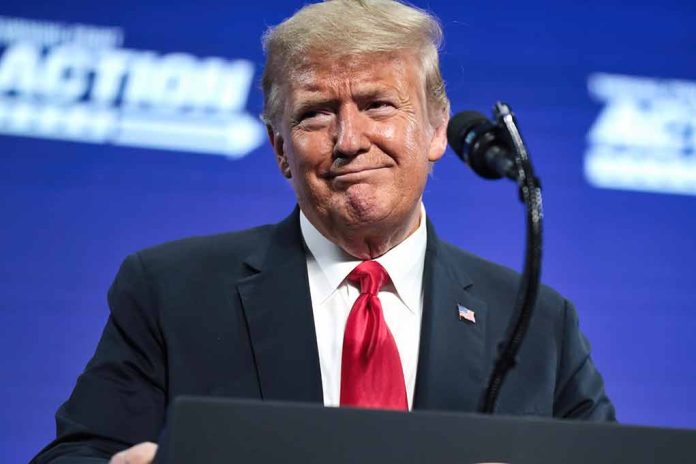
Donald Trump’s plan to end remote work for federal employees sparks controversy and legal challenges.
At a Glance
- Trump vows to challenge telework agreement for federal employees in court
- Union representing federal workers prepares to defend remote work protections
- Trump’s advisers aim to increase government efficiency and reduce costs
- Debate highlights clash over work culture adaptation post-pandemic
- Legal and spatial challenges complicate enforcement of office return mandate
Trump’s Controversial Directive
President-elect Donald Trump has ignited a fierce debate by announcing his intention to end remote work for federal employees. This directive aims to mandate a return to traditional office environments, challenging telework agreements established under prior leadership. The move has met with significant resistance from government workers and their unions, who argue that the policy violates existing contracts and ignores the benefits of remote work.
Trump’s plan to challenge the telework agreement in court has set the stage for a legal battle. The American Federation of Government Employees (AFGE), representing a large portion of federal workers, has vowed to fight back against any attempts to block the agreement that allows remote work until 2029.
Legal and Practical Challenges
The implementation of Trump’s directive faces significant hurdles. Approximately 56% of the civil service is covered by collective bargaining contracts that often include telework options. These existing agreements complicate any attempts to unilaterally change work arrangements. Additionally, spatial limitations in federal buildings pose practical challenges to a full return to pre-pandemic office policies.
“It’s in a lot of labor contracts, And at a lot of these agencies, the reality is, they don’t have the place to put people to force them back five days a week.” – Cathie McQuiston
Trump’s stance on the issue is clear and uncompromising. He has stated that federal workers who refuse to return to office work will be dismissed, setting the stage for potential mass terminations and legal disputes.
President-elect Donald Trump’s plan to have all federal employees return to their offices full-time could already be hitting a snag thanks to a union deal.https://t.co/hML7iCiWHT
— WSBT (@WSBT) December 5, 2024
Efficiency vs. Flexibility Debate
The push to end remote work is part of a broader effort by Trump’s advisers, including Vivek Ramaswamy and Elon Musk, to increase government efficiency and reduce costs. They argue that requiring in-office work could lead to voluntary terminations, which they view as a positive outcome for reducing the size of the federal workforce.
“Requiring federal employees to come to the office five days a week would result in a wave of voluntary terminations that we welcome: If federal employees don’t want to show up, American taxpayers shouldn’t pay them for the Covid-era privilege of staying home.” – Elon Musk and Vivek Ramaswamy
However, federal employees and unions argue that telework improves productivity and competitiveness with private companies. They emphasize that remote work has been part of federal policy since before the pandemic, adopted by some agencies to recruit talent and reduce emissions.
Cultural and Political Implications
The debate over telework has become part of a broader culture war, with some conservatives criticizing it as a taxpayer-funded perk that reduces performance. This perspective clashes with the view that flexible work arrangements are necessary for modern workforce management and employee satisfaction.
“The pandemic is long over, and it is past time for the federal workforce to return to in-person work, On the contrary, the evidence suggests that Americans have suffered under these lenient telework policies.” – Rep. James Comer
The outcome of this debate could have far-reaching implications for federal work culture, government efficiency, and the broader conversation about work-life balance in the post-pandemic era. As the legal challenges unfold and political pressures mount, the future of remote work for federal employees remains uncertain, with potential ripple effects across the public and private sectors.
Sources:
- Key union vows to fight back after Trump says he would end remote work for federal employees
- Trump says federal workers who don’t want to return to the office are “going to be dismissed” – CBS News
- Trump wants federal workers back in the office. It may be a tall task.






